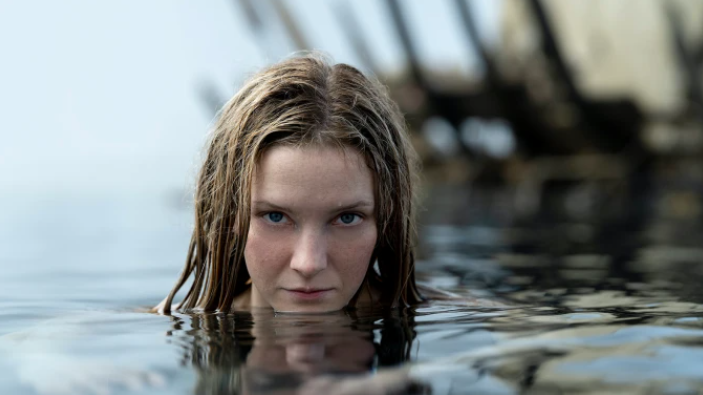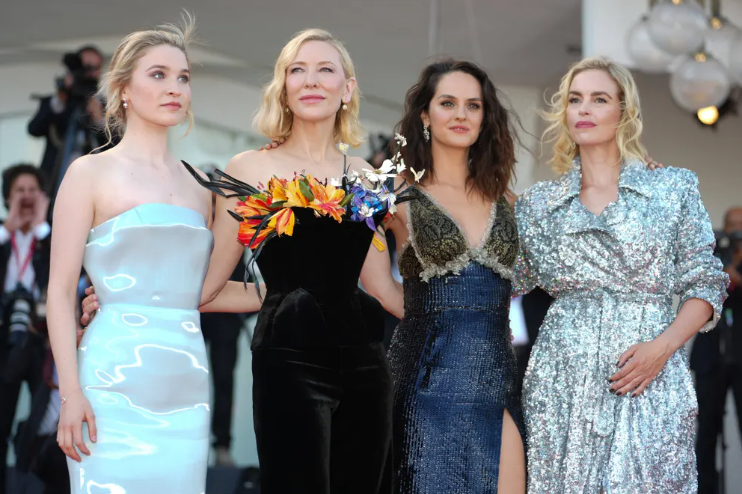With a record-breaking budget spent on recreating J.R.R. Tolkien’s Middle-earth during the Second Age and a cast of nearly two dozen series regulars and dozens more featured players deployed to enact its sprawling tale of the rise of Sauron, “The Lord of the Rings: The Rings of Power” is as big a TV show as TV shows have ever been.
Even so, Galadriel is unquestionably the show’s focal point. Tolkien’s “The Lord of the Rings” novels and Peter Jackson’s “Rings” series, in which Cate Blanchett plays Galadriel, have a pivotal character who is so old she was born before the moon and the sun ever blessed Middle-earth.
Young Galadriel in “The Rings of Power,” which takes place thousands of years before “The Lord of the Rings,” is not yet the calm and wise co-ruler of the Elven kingdom of Lothlórien. In its place, she is obsessed with tracking down the curiously absent Dark Lord Sauron, the master of evil who was responsible for the death of Galadriel’s brother. Galadriel is a jaded old lady in “Rings of Power,” having lived for millennia, but she is not yet the fearsome old lady she will become in the Third Age.
Morfydd Clark (“Saint Maud”) succeeds in portraying Maud in all her complexity. Critic Caroline Framke of Variety lauds Clark’s “arresting gravitas,” writing, “tasked with making Galadriel equal parts voice of reason and battling hero, Clark proves the series’ most reliable constant.”
Thanks to her parents, Clark has been a lifetime lover of Tolkien, so she has always known the value of Galadriel. My friends are all huge ‘Lord of the Rings fans, and I have to tell you, they describe her to me a lot, she says Variety. She is a living legend; she is a story coming to life.
Clark says that she didn’t find out she was cast as Galadriel by showrunners J.D. Payne and Patrick McKay until after she had already decided to join “The Rings of Power” and landed in New Zealand in the fall of 2019 to shoot the first season. The pandemic extended the journey to nearly two years, taking the now-33-year-old woman far beyond the boundaries she had set for herself. She spoke with Variety about how she prepared to perform all of Galadriel’s stunts, how her Welsh heritage helped her with Tolkien’s Elvish language, what it was like to spend so much unexpected time in New Zealand, and what she would say to Tolkien fans who were shocked to see Galadriel as a badass warrior.

When in the audition process did you understand that you were in the running to play Galadriel?
When I first landed in New Zealand, I had no idea that I would be playing Galadriel. I was portraying an elf. As far as I was concerned, it was already the Second Age. With my sister by my side, we read it all, and I kept convincing myself that I was Celebran, her daughter, because the idea of it being Galadriel seemed impossible. It seems crazy now that I traveled to New Zealand without knowing who I would be playing. It was a uniform action on the part of the cast. We all sort of dove into this mayhem at the same time and ran into each other underground. Not knowing who I was supposed to portray until I got there meant that I had to adjust my performance accordingly. Believe me, I’m still having trouble wrapping my head around the character I’m playing.
As for me, I had read both “The Hobbit” and “The Lord of the Rings.” To be honest, I had not read very far into “The Silmarillion.” The exact nature of her actions was hidden from me. Tolkien writes that before going into battle, Galadriel plaits her hair into a crown. As this unfolded, I found myself thinking, wow, this does unlock a lot of doors. Tolkien evolved his view of Galadriel, which adds to the character’s appeal. It started to consume me, like, why did Tolkien need Galadriel to be that at that point? His feelings for her likely deepened with time, lending an air of malleability to her persona.
In the first two episodes alone, you’re climbing, you’re fighting, you’re swimming, you’re diving deep into the water. Did you have a sense your role would be so physical, at least?
No. That came as such a shock. For whatever reason, I’ve never considered myself to be very gifted in that area. As for me, I have dyslexia. Since I am terrible at putting my thoughts on paper, I was given extra time during tests. So naturally, I was doubtful that I could accomplish all that was required of me. My coworkers were angels for convincing me to take that step. The fact that I was able to accomplish so much is a tribute to them. The stunt team was fantastic, and not only because of what they taught us to do physically; a large part of the battle is convincing yourself that you can do what you’re trying to do. Everyone could learn a lot from the New Zealand stunt crews, in my opinion. We’d be a lot more content if our training for this job was more like stunt school.
What did you do to prepare? What was the process?
Every morning would begin with three hours of stunts, which included general strength and flexibility training before progressing to the swords. Initially, there would be around twenty of us, and we’d study a sword battle together, then put on a performance fit for a troupe of elves. Matt, our fantastic personal trainer, was someone I occasionally disliked. However, I consider that to be a necessary trait in a successful personal trainer. I got to do a lot of climbing, which I enjoy doing. It’s great to have at least one area in which you can learn something and feel somewhat confident about your progress. If you don’t, you might start to feel hopeless. To follow that, I went swimming. I foolishly thought I could swim before taking my first class and realized I belonged nowhere near the ocean. Now, though, owing to Trent Bray, I am a proficient swimmer.
How was it for you to incorporate the Elvish language into your performance?
Yes, I attended a school where the medium of instruction was Welsh. Because of its phonetic nature, Welsh is ideally suited for the dyslexic. By the third year, I was completely perplexed by the English language and its seemingly endless grammar rules. My mother, a Tolkien fanatic, always made a point to tell us how much of an influence the Welsh language had on her son. So, oddly, his writings have become a badge of honor for me, given the Welsh preoccupation with all things Welsh. It was a blast to get to use both languages in my performance. And I do believe it served me well.

Some fans have a very specific image of Galadriel in their heads as this regal woman of the woods who is not physical in the way you are on the show. What would you say to fans who are sort of surprised by or skeptical of the interpretation of Galadriel in “The Rings of Power”?
Her calmness is something she has worked for, in my opinion. I don’t think you can attain such enlightenment without first facing adversity. I was pleased to notice that she alludes to the loss of purity that comes with increasing wisdom, which is a theme that appears frequently throughout the legends. Because, you know, how young can you be if you’re still thousands of years old? That’s why she was wondering how much of her childhood innocence she had lost. By the Third Age, the elves have progressed to some extent. The First Age elves are a chaotic lot who constantly pick fights, make fun of each other, and screw each other over. As the chronicles of Middle-earth, they are ever-evolving. For those of us who were playing canon characters, it was fascinating to go into their origin stories and see how they came to be the people we know today.
The show is such a massive commitment — the showrunners have said that they’re planning a 50-episode series. All of my questions were prepared thinking that you knew more going into the show, so how much of that commitment was a factor for you in signing up to make “The Rings of Power”?
Yeah, I didn’t know. You don’t give those considerations much thought during an audition for a role like this because you never imagine you’ll get it. I don’t let myself daydream or fantasize before an audition because it causes me to become emotionally invested in the roles I’m considering. In all honesty, I’m still trying to wrap my head around what this implies. The next couple of weeks will be crucial for that, but they will also be somewhat relieving. When you create anything, you want others to be able to appreciate it. It’s high time that this takes place. But I anticipate another period of acclimation.
How long were you in New Zealand from start to finish?
The original plan called for a stay of nine months, but circumstances dictated that I spend October 2019 through August 2021 in New Zealand instead. It’s been almost two full years.
So what did you do to pass the time?
We weren’t able to kill much time because of how hectic things were. The opportunity to travel over South Island was a dream come true for me. When you’re in New Zealand, you’re always experiencing something sublime. That’s significant because it illustrates how much the Elves value their connection to the natural world. They place a high value on aesthetics and consider it to be one of the main reasons for living. So, that’s encouraging to hear. I spent a lot of time crafting. I was also fortunate enough to make some wonderful acquaintances among my neighbors, who essentially became my second family. You know, when I went to New Zealand, I didn’t think I’d come back feeling like I was leaving home again. That’s a wrap, I guess. [Deep breath] I appreciate the warm welcome I received when I arrived in New Zealand.
Finally, you mentioned earlier that you thought you’d been cast as Galadriel’s daughter. She does meet her husband and has a daughter in the Second Age — is that something that we might get hints of this season?
A significant element of Galadriel’s identity comes from her family. With five full seasons, there’s a lot of ground to cover.



















































































